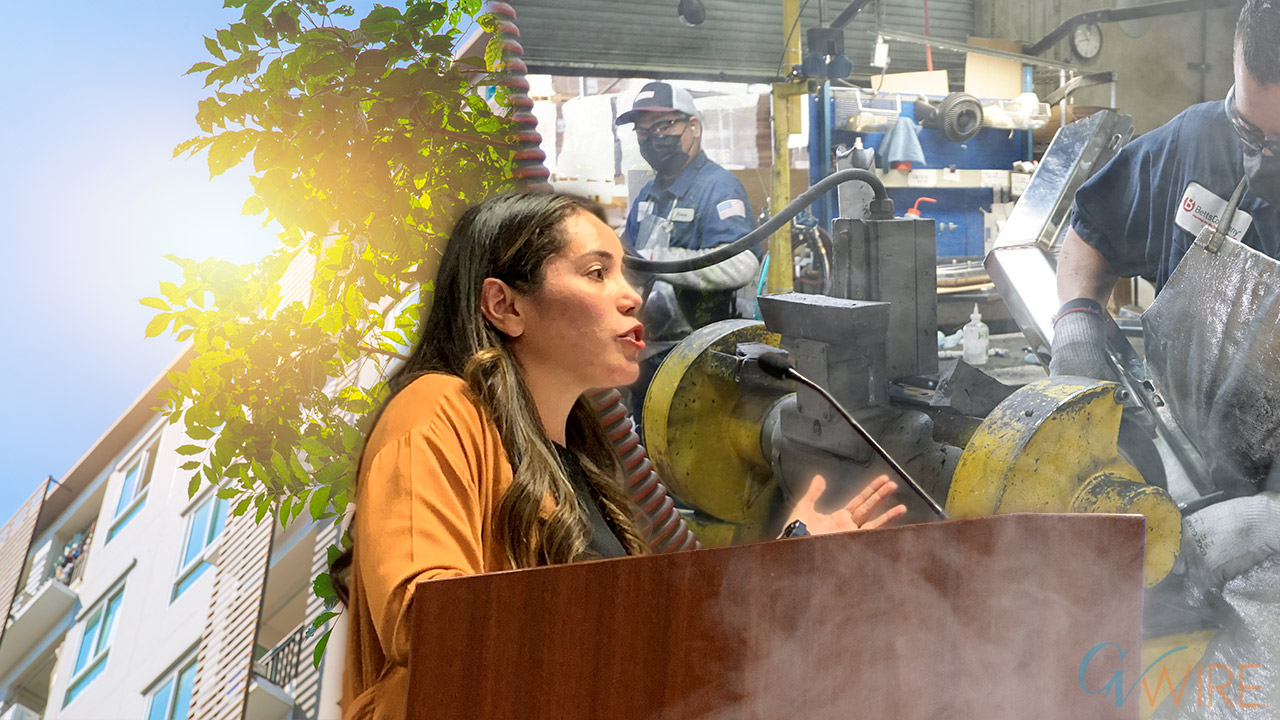Leadership Counsel for Justice and Accountability has been present in many discussions about south Fresno land use. The nonprofit has critics and defenders over its role in shaping both industrial and residential development. (GV Wire Composite/Paul Marshall)

- Leadership Counsel for Justice and Accountability is a force in many policy efforts to transform land use use policies in Fresno.
- City councilmembers are split on social justice efforts. Some say they hurt development and jobs; others say they protect neglected communities.
- Leadership Counsel derives much of its funding from outside groups. It won a major lawsuit against the city of Fresno.
Share
|
Getting your Trinity Audio player ready...
|
In a 2023 video celebrating its 10th anniversary, Leadership Counsel for Justice and Accountability spoke about the need to protect neglected communities.
“There is a really deeply entrenched culture of decision-making that absolutely does not believe that advocates, that residents, that communities of color deserve a seat at the table, get to be at the table, so we had to start to enter those spaces and say, ‘No, we’re going to be at the table, we deserve to be at the table, we’re not taking ‘no’ for an answer,’ ” said Ashley Werner, former directing attorney for the group.
A year later, Fresno City Hall encountered a problem it hadn’t recently faced: a $47 million budget deficit. Some Fresno leaders blamed environmental policies more restrictive than those in other communities. Simply put, they said, Fresno’s hands are tied when it comes to growing jobs and developing new projects.
City Councilmember Mike Karbassi described Fresno as a city sinking in the muck and mire of a philosophical crossroads.
“The problem is for years, while I’ll be frank, the private sector has been very quiet,” Karbassi said at a Sept. 29 council meeting. “We’ve allowed outside dollars and outside interests to try to turn us into an economy where it’s expected all these services and all these public benefits to people like clean parks and roads that are in perfect condition — as they should be — without having the ability to invest dollars to have jobs created here.”
Related Story: Are You One of 22,000 Working in South Central Fresno? A Rezone Might Threaten ...
As fellow councilmember Miguel Arias explains it, social justice groups are drawing a line in the pavement over projects that burden the city’s south side with air pollution and further degrade neighborhoods there. He said if north Fresno residents faced many of the projects drawn up for south Fresno, they would oppose them, too.
“(We) got here because they were shoving 1 million-square-foot warehouse distribution centers down the throat of south Fresno residents who didn’t have legal representation at that time, and now they do.” Arias said. “They took (the city) to court, as they have a right to, and they won.”
Development Moratorium or Long-Needed Fix?
Leadership Counsel and the South Fresno Community Alliance sued the city in 2021 for its Program Environmental Impact Report, saying it did not properly address air quality, water availability, and traffic management. Builders rely on these documents to build in compliance with CEQA, the state’s landmark environmental law.
California’s 5th Appellate Court sided with the groups on Aug. 6, and dozens of prospective business owners were told to halt their projects — including hundreds of new homes. The judge gave the city six points to fix before any projects can cite the document and move forward.
Related Story: Are You One of 22,000 Working in South Central Fresno? A Rezone Might Threaten ...
“It’s essentially a moratorium,” said Dirk Poeschel, principal at Land Development Services, a consulting company for business owners.
But Fresno’s employers face more than just that decision. Also in dispute: an ongoing truck route study, decisions about land use in Fresno, and a lawsuit against a proposed Highway 99 interchange improvement.
Behind those lawsuits and environmental policies are community groups with substantial outside funding.
Leadership Counsel and South Fresno Community Alliance said it would not comment on questions from GV Wire or on the Program EIR.
“As we have communicated to the city, South Fresno Community Alliance is committed to having good faith, productive conversations about next steps, and that’s where our focus currently lies,” said a spokesperson with Leadership Counsel.
Major Victory for Leadership Counsel in 2017
Founded in 2013 by attorney Phoebe Seaton and legal worker Veronica Garibay, Leadership Counsel largely came into Fresno’s development scene in 2017 when it successfully lobbied to stop an industrial project in south central Fresno proposed by Caglia Environmental. At the time, Leadership Counsel said the project would bring increased traffic and air pollution to the area.
Then-California Attorney General Xavier Becerra weighed in, threatening the city with legal action if it approved the project. Before that, it was rare to have a state official weigh in on a local land use decision, Caglia said.
“That moment in time was pivotal, that was kind of the catalyst for things to come,” Caglia said.
Related Story: Give-and-Take Between Dyer & Council Yields a Fresno Budget. What’s ...
That year, Leadership Counsel received a grant from the Central Valley Community Foundation, according to a grant recipient list acquired by GV Wire.
Led by former Fresno Mayor Ashley Swearengin, the Community Foundation not only serves as a clearinghouse for donors to give to nonprofit organizations, but also leads several initiatives aimed at land use reform and job creation.
Leadership Counsel serves as a lead partner in the foundation’s DRIVE Initiative, managing the fund’s permanent affordable housing side.
The multi-billion-dollar DRIVE Initiative has helped improve streets, build affordable housing, and secure funding for infrastructure projects throughout Fresno.
Leadership Counsel’s Dark Money Funding
From tax year 2018 to its most recent filing in 2021, Leadership Counsel’s assets have grown from $2.6 million to nearly $13.8 million. The group derives most of its funding from contributions and grants.
When it first began, the group was funded by San Francisco-based The Tides Center, according to IRS 990 filings. After November 2018, Leadership Counsel spun off and began operating independently of The Tides Center.
With more than $500 million in assets in 2021, Tides Center was one of the first models of its kind — providing a source for donors to give to groups anonymously, often referred to as “dark money.” The Tides Foundation, reported more than $1.1 billion in assets that same year.

Tides Center has been a major donor for international social justice efforts, especially at the local level.
“In 2022, Tides projects worked in the areas of environmental sustainability, climate change, and sustainable agriculture practices,” the group reported in its 990 filing that year. “Programs worked at the local level to address environmental issues facing low-income, marginalized communities.”
After breaking off from Tides Center, Leadership Counsel reported funding from other foundations such as the Kresge Foundation, the California Endowment, and the James Irvine Foundation.
Group Partners With Fresno State on Jobs Study Panned by Critics
Earlier this year, the group, along with Fresno State, published a study claiming industrial companies aren’t employing people from south Fresno. The study came out as the city council prepared to finish the long-awaited South Central Specific Plan, which would dictate land use for much of the city’s industrial land.
The study drew broad conclusions about employment and pollution while only looking at two points in time and using three census tracts. Funding for the study came from the Kresge Foundation.
Arias referenced the study during a council discussion on truck routes.
“It’s not like (residents) are benefitting in any way because they’re not even being employed by these job hubs,” Arias said during the Sept. 29 meeting.
But the study had several flaws, critics said. Authors used 2020 — a COVID year marked by high unemployment — to demonstrate employment did not increase in south Fresno
It also only used two census tracts, both of which bucked city housing trends, according to a study by John Dunham & Associates commissioned by the pro-business group INVEST Fresno.
Housing units in both tracts decreased in the six-year period analyzed, according to the Dunham study.
Business Owners Missing From Discussions
The city uses specific plans to outline how land should be divided between residential and commercial use.
The South Central Specific Plan, still being worked on, could change how thousands of acres of land historically dedicated to industrial use will look into the future.
As the city debates how to zone land in the area, the city is performing a truck route study, determining what trucks can drive where.
During the Sept. 29 city council meeting, Director of Public Works Scott Mozier said the plan eliminates a third of truck routes.
Karbassi said at the meeting many businesses weren’t involved in the study until after the plan was drafted. Business owners told him they were worried about becoming involved in future litigation filed by the community organizations.
“I’m a little concerned that the people that are going to be most impacted may really not have been a part of that process of formulating this study,” Karbassi said.

Lawsuit Against Improving the Study’s Preferred Truck Route
One proposal from the truck route study’s community steering committee was to remove routes from within 1,000 feet of sensitive receptors such as schools, parks, homes, and community centers.
When Fresno City Council President Annalisa Perea asked during the meeting if any other distance had been studied, Fresno’s Chief Transportation Planning Engineer Andreina Aguilar said no.
Aguilar also said that after the city didn’t use the 1,000-foot buffer zone, the steering committee wanted the truck route study completely redone, possibly undoing years of work.
The steering committee is made up of 35 people including community organizations, residents, businesses, local governments, agencies, and the Valley Air District.
“The CSC feels that the goals of removing routes from sensitive receptors was not done,” Aguilar said.
The study prefers North Avenue, eliminating Central Avenue. But an active lawsuit from Leadership Counsel attempts to stop Caltrans from improving both North and American avenues.
The $105 million project would widen on- and off-ramps, adding signals to the truck-heavy interchanges for safety and ease, according to Caltrans.
However, Leadership Counsel claims the new interchanges would increase greenhouse gas emissions in the communities of Calwa and Malaga.
“This is a prelude to a larger battle where even though land use may not have been changed, not allowing trucks on a street would be a de facto ban on industrial,” Karbassi said.
RELATED TOPICS:
Categories



















